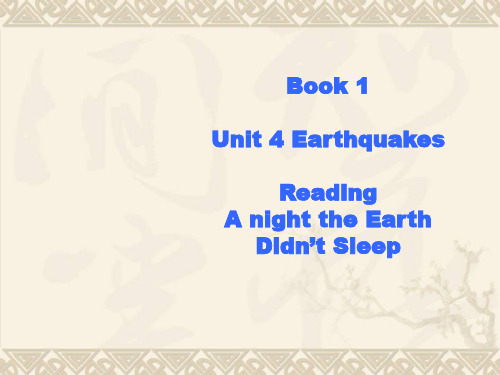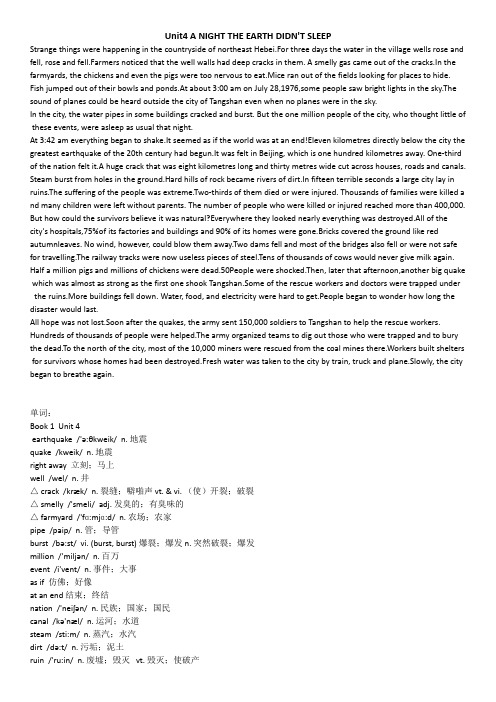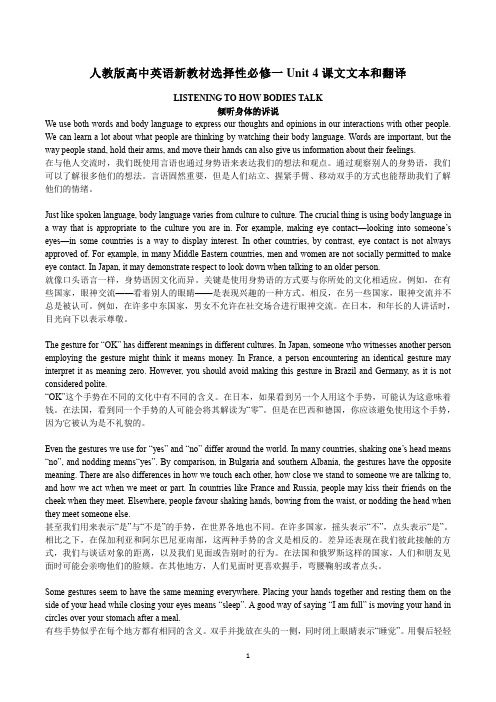高中英语人教版必修一 Unit4 课文内容
- 格式:doc
- 大小:68.50 KB
- 文档页数:12




高中英语必修一unit4课文教学目标:1、让学生掌握与“灾难”相关的词汇和表达方式。
2、了解地震的基本成因和应对方法。
3、培养学生的阅读能力和分析能力。
4、培养学生的灾难意识和自我保护意识。
教学内容:5、词汇:掌握与“灾难”相关的词汇,如earthquake,disaster,flood,fire,tsunami等。
6、阅读:阅读一篇关于地震成因和应对方法的文章。
7、听力:听一段与地震相关的音频,了解地震的基本知识。
8、写作:根据所学知识,写一篇关于地震的短文。
教学步骤:Step 1: Warm-up(5 minutes)9、与学生进行简单的问候和交流,了解他们的兴趣和爱好。
10、通过展示一些与“灾难”相关的图片,引导学生谈论他们所了解的灾难类型和影响。
11、引入本单元的主题:“灾难”。
Step 2: Vocabulary (10 minutes)12、教师出示一些与“灾难”相关的词汇,如earthquake,disaster,flood,fire,tsunami等,并让学生掌握这些词汇的发音和意思。
13、教师将这些词汇放入句子中,让学生进行翻译和运用。
Step 3: Reading (20 minutes)14、教师让学生快速阅读一篇关于地震成因和应对方法的文章,并回答以下问题:•What is the cause of earthquakes?•What should we do to prepare for an earthquake?•What should we do after an earthquake?15、教师引导学生深入分析文章内容,掌握文章的主旨和细节信息。
16、教师出示一些与文章内容相关的词汇和表达方式,让学生进行记忆和应用。
Step 4: Listening (10 minutes)17、教师播放一段与地震相关的音频,让学生了解地震的基本知识。
18、教师让学生回答以下问题:•What is the difference between an earthquake and a tremor?•What should you do during an earthquake?•What should you do after an earthquake?19、教师引导学生总结音频中的重点内容,加深学生对地震知识的理解。

Unit4A NIGHT THE EARTH DIDN'T SLEEPStrange things were happening in the countryside of northeast Hebei.For three days the water in the village wells rose and fell,rose and fell.Farmers noticed that the well walls had deep cracks in them.A smelly gas came out of the cracks.In the farmyards,the chickens and even the pigs were too nervous to eat.Mice ran out of the fields looking for places to hide. Fish jumped out of their bowls and ponds.At about3:00am on July28,1976,some people saw bright lights in the sky.The sound of planes could be heard outside the city of Tangshan even when no planes were in the sky.In the city,the water pipes in some buildings cracked and burst.But the one million people of the city,who thought little of these events,were asleep as usual that night.At3:42am everything began to shake.It seemed as if the world was at an end!Eleven kilometres directly below the city the greatest earthquake of the20th century had begun.It was felt in Beijing,which is one hundred kilometres away.One-third of the nation felt it.A huge crack that was eight kilometres long and thirty metres wide cut across houses,roads and canals. Steam burst from holes in the ground.Hard hills of rock became rivers of dirt.In fifteen terrible seconds a large city lay in ruins.The suffering of the people was extreme.Two-thirds of them died or were injured.Thousands of families were killed a nd many children were left without parents.The number of people who were killed or injured reached more than400,000. But how could the survivors believe it was natural?Everywhere they looked nearly everything was destroyed.All of thecity's hospitals,75%of its factories and buildings and90%of its homes were gone.Bricks covered the ground like red autumnleaves.No wind,however,could blow them away.Two dams fell and most of the bridges also fell or were not safe for travelling.The railway tracks were now useless pieces of steel.Tens of thousands of cows would never give milk again. Half a million pigs and millions of chickens were dead.50People were shocked.Then,later that afternoon,another big quake which was almost as strong as the first one shook Tangshan.Some of the rescue workers and doctors were trapped under the ruins.More buildings fell down.Water,food,and electricity were hard to get.People began to wonder how long the disaster would last.All hope was not lost.Soon after the quakes,the army sent150,000soldiers to Tangshan to help the rescue workers. Hundreds of thousands of people were helped.The army organized teams to dig out those who were trapped and to bury the dead.To the north of the city,most of the10,000miners were rescued from the coal mines there.Workers built shelters for survivors whose homes had been destroyed.Fresh water was taken to the city by train,truck and plane.Slowly,the city began to breathe again.单词:Book1Unit4earthquake/'ə:θkweik/n.地震quake/kweik/n.地震right away立刻;马上well/wel/n.井△crack/kræk/n.裂缝;噼啪声vt.&vi.(使)开裂;破裂△smelly/'smeli/adj.发臭的;有臭味的△farmyard/'fɑ:mjɑ:d/n.农场;农家pipe/paip/n.管;导管burst/bə:st/vi.(burst,burst)爆裂;爆发n.突然破裂;爆发million/'miljən/n.百万event/i'vent/n.事件;大事as if仿佛;好像at an end结束;终结nation/'neiʃən/n.民族;国家;国民canal/kə'næl/n.运河;水道steam/sti:m/n.蒸汽;水汽dirt/də:t/n.污垢;泥土ruin/'ru:in/n.废墟;毁灭vt.毁灭;使破产in ruins严重受损;破败不堪suffering/'sʌfəriŋ/n.苦难;痛苦extreme/ik'stri:m/adj.极度的injure/'indʒə/vt.损害;伤害△survivor/sə'vaivə/n.幸存者;生还者;残存物destroy/di'strɔi/vt.破坏;毁坏;消灭brick/brik/n.砖;砖块dam/dæm/n.水坝;堰堤track/træk/n.轨道;足迹;痕迹useless/'ju:slis/adj.无用的;无效的;无益的shock/ʃɔk/vt.&vi.(使)震惊;震动n.休克;打击;震惊rescue/'reskju:/n.&vt.援救;营救trap/træp/vt.使陷入困境n.陷阱;困境electricity/ilek'trisəti/n.电;电流;电学disaster/di'zɑ:stə/n.灾难;灾祸dig out掘出;发现bury/'beri/vt.埋葬;掩埋;隐藏mine/main/n.矿;矿山;矿井miner/main/n.矿工shelter/'ʃeltə/n.掩蔽;掩蔽处;避身处a(great)number of许多;大量的title/'taitl/n.标题;头衔;资格reporter/ri'pɔ:tə/n.记者bar/bɑ:/n.条;棒;条状物damage/'dæmidʒ/n.&vt.损失;损害frighten/'fraitən/vt.使惊吓;吓唬frightened/'fraitnd/adj.受惊的;受恐吓的frightening/'fraitəniŋ/adj.令人恐惧的congratulation/kənɡrætʃu'leiʃən/n.祝贺;(复数)贺词judge/dʒʌdʒ/n.裁判员;法官vt.断定;判断;判决sincerely/sin'siəli/adv.真诚地;真挚地express/ik'spres/vt.表示;表达n.快车;速递outline/'autlain/n.要点;大纲;轮廓headline/'hedlain/n.报刊的大字标题cyclist/'saiklist/n.骑自行车的人。





Unit 4 A NIGHT THE EARTH DIDN’T SLEEPStrange things were happening in the countryside of northeast Hebei. For three days the water in the village wells rose and fell. Farmers noticed that the well walls had deep cracks in them. A smelly gas came out of the fields looking for places to hide. Fish jumped out of their bowls and ponds. At about 3:00 am on July 28, 1976, some people saw bright lights in the sky. The sound of planes could be heard outside the city of Tangshan even when no planes were in the sky. In the city, the water pipes in some buildings cracked and burst. But the one million people of the city, who thought little of these events, were asleep as usual that night.At 3:42 am everything began to shake. It seemed as if the world was at an end! Eleven kilometres directly below the city one of the greatest earthquakes of the 20th century had begun. It was felt in Beijing, which is more than two hundred kilometres away. One-third of the nation felt it. A huge crack that was eight kilometres long and thirty metres wide cut across houses, roads and canals. Steam burst from holes in the ground. Hard hills of rock became rivers of dirt. In fifteen terrible seconds a large city lay in ruins. The sufferings of the people was extreme. Two-thirds of them died or were injured during the earthquake. The number of people who were killed or seriously injured reached more than 400,000.But how could the survivors believe it was natural? Everywhere they looked nearly everything was destroyed. All of the city’s hospital, 75%of its factories and buildings and 90%of its homes were gone. Bricks covered the ground like red autumn leaves. No wind, however, could blow them away. Two dams fell and most of the bridges also fell or were not safe for travelling. The railway tracks were now useless pieces of steel. Tens of thousands of cows would never give milk again. Half a million pigs and millions of chickens were dead. Sand now filled the wells instead of water. People were shocked. Then, later that afternoon, another big quake which was almost as strong as the first one shook Tangshan. Water, food, and electricity were hard to get. People began to wonder how long the disaster would last.All hope was not lost. Soon after the quakes, the army sent 150,000 soldiers to Tangshan to help the rescue workers. Hundreds of thousands of people were helped. The army organized teams to dig out those who were trapped and to bury the dead. To the north of the city, most of the 10,000 miners were rescued from the coal mines there. Workers built shelters for survivors whose homes had been destroyed. Fresh water was taken to the city by train, truck and plane. Slowly, the city began to breathe again.。

劝君莫惜金缕衣,劝君惜取少年时!!!Unit4 Natural Disasters 自然灾害本单元以“自然灾害”的话题,从听,说,读,写,句法结构等方面预习此单元。
MATEBOOK 132020/10/4Unit 4 Natural Disasters 第一部分:必备词汇和短语(key words and phrases):基础词汇:1.Tornado n. 龙卷风;旋风ndslide n. 崩塌;滑坡3.Tsunami n. 海啸4.Magnitude n.震级,重大5.Crack n.&v. 裂开,裂缝6.Percent n. 百分比7.Brick n. 砖8.Trap v. 使落入陷阱9.Drought n.干旱10.Slide vt. 滑坡11.Wave n.波浪,风浪12.Volcano n. 火山13.Typhoon n. 台风14.Hurricane n. 飓风15.Tap v.轻叩轻敲16.Pipe n. 管道17.Whistle v.吹口哨18.Kit n.成套设备19.Crash v.撞词汇派生拓展:1.Disaster n. 灾难-----disastrous adj.-灾难的-----disastrously adv.灾难地2.Flood n. 洪水-----flooding n.涝灾-----flooded adj. 发洪水的3.Rescue n.救援----rescuer n. 救援者4.Destroy v.破坏---destroyer n破坏者---destruction n.破坏----destructive adj 破坏性的5.evacuate vt.使疏散-----evacuation n 疏散,撤离6.death n.死-----die v. 死-------dead adj.------死的,没有生命的7.affect v. 影响-----affected adj. 有影响的------affection n.影响8.shelter n.庇护所-----sheltered adj. 有庇护的9.ruin v. 毁坏-----ruined adj.毁灭的10.metal n.-金属----metallic adj. 金属的11.shock n. V.震惊,惊讶—shocked 震惊的----shocking 令人震惊的12.electricity 电---electric 电的----electrical 电子的13.bury vt 埋葬-----burial n 埋葬14.breathe v呼吸.----breath n,呼吸-----breathless adj.上气不接下气的15.revive v 恢复------revival n.恢复16.effort n.努力-----effortless adj 毫不费力的17.wisdom n.智慧---wise adj. 明智的---wisely adv. 明智地18.Context n.上下文----contextual adj.练习上下文的19.Suffer v 遭受----sufferer n.遭受者------suffering n. 遭受20.Erupt v.爆发----eruption n. 爆发21.Supply v.供应---supplier n.—供应商22.Survive v.幸存—survivor n. 幸存者---survival n.幸存23.Power n.权利----powerful adj. 有权利的24.Emergency n.紧急---emergent adj. 紧急的-----emergence n.急诊25.Effect n.影响----effective adj. 有影响力的---ineffective 无影响力的26.Length n.长度----lengthen v,加长27.Deliver v.运输,输送----delivery n. 运输28.Strike v.罢工,袭击---striker n.----罢工者.短语积累:1.At least 至少2.Set up 建立e out of 出来4.As usual 像往常一样5.As if 似乎好像e to an end 结束7.Cut across 打断,径直穿过8.In ruins 严重受损9.Nothing but 只不过,除了10.Blow away 吹走11.In shock 震惊吃惊12.Fall down 倒下13.Dig out 挖掘14.Get up on one’s feet 重新站起来15.In times of 在的时刻,在时期16.Suffer from 遭受17.Go through 经历,讨论18.Volunteer to do sth. 自愿做什么事19.Wake up 叫醒20.Put up 张贴21.In the open air 在户外22.Stay calm 保持冷静23.Stay away from 远离24.Make sure 确信,确保25.First aid kit 一套急救设备26.In danger 处在危险处境27.On hand 在手边28.Crash into 冲撞29.Sweep away 消灭,彻底消除30.The number of 的数量31.Be expect to do 被期待做32.Write down 写下第二部分: 听力素养(listening skills)听说词汇:1. A strong earthquake 一场大地震2.Fall down 倒下3.Help the survivors 帮助幸存者4.Homes and land 家园和土地5.Be trapped in 陷入,被困于6.Rescue from 从… 中救援出来7.Volunteers and rescue workers 志愿者和救援人员8.Day and night 日夜9.Make sure 确信10.Caused by 由… 造成11.In the landslide 在滑坡中12.Lose one’s life 失去生命13.Get away from 避免听说句式;1. A strong earthquake hit Ecuador yesterday.昨天厄尔多瓜发生了一场大地震。

人教版高中英语新教材选择性必修一Unit 4课文文本和翻译LISTENING TO HOW BODIES TALK倾听身体的诉说We use both words and body language to express our thoughts and opinions in our interactions with other people. We can learn a lot about what people are thinking by watching their body language. Words are important, but the way people stand, hold their arms, and move their hands can also give us information about their feelings.在与他人交流时,我们既使用言语也通过身势语来表达我们的想法和观点。
通过观察别人的身势语,我们可以了解很多他们的想法。
言语固然重要,但是人们站立、握紧手臂、移动双手的方式也能帮助我们了解他们的情绪。
Just like spoken language, body language varies from culture to culture. The crucial thing is using body language in a way that is appropriate to the culture you are in. For example, making eye contact—looking into someone’s eyes—in some countries is a way to display interest. In other countries, by contrast, eye contact is not always approved of. For example, in many Middle Eastern countries, men and women are not socially permitted to make eye contact. In Japan, it may demonstrate respect to look down when talking to an older person.就像口头语言一样,身势语因文化而异。



高中英语人教版必修一U n i t4课文内容-CAL-FENGHAI.-(YICAI)-Company One1必修一 Unit4 课文内容1.You have time to take only one thing.time后接不定式短语to take only one thing作定语。
△动词不定式作后置定语动词不定式可以做后置定语,修饰前面的名词或代词,一般强调动作将要发生。
Have you got anything to send?I have nothing to say.△不定式与所修饰词间的关系可有一下4种:⑴主谓关系被修饰的名词或代词实际上是不定式的逻辑主语。
如:We need someone to help with the work. (someone will help with the work)⑵动宾关系被修饰的名词或代词是动词不定式的逻辑宾语。
如:I have many letters to write. (to write many letters)⑶同位关系不定式与所修饰的名词指的是一回事。
如:We have made a plan to learn from Lei Feng.⑷状语关系被修饰的名词实际上表示动词不定式动作的方式、时间等。
这些名词多是抽象名词。
如:That's the way to do it. 那样做才对。
I have no time to go there. 我没有时间去那儿。
△作定语的不定式如果含有不及物动词,且不定式所修饰的名词或代词表示地点、工具等,不定式后需要有相应的介词,但当不定时所修饰的名词是time, place 或way时,不定式后的介词通常省去。
Please give me a knife to cut with.Mary had no money and no place to live.△辨析:动名词、现在分词做定语⑴动名词作定语时,和它所修饰的名词之间没有逻辑上的主谓关系,只表示被修饰名词的一般用途,必须位于名词之前。


必修一Unit4 课文内容1.You have time to take only one thing.time后接不定式短语to take only one thing作定语。
△动词不定式作后置定语动词不定式可以做后置定语,修饰前面的名词或代词,一般强调动作将要发生。
Have you got anything to sendI have nothing to say.△不定式与所修饰词间的关系可有一下4种:⑴主谓关系被修饰的名词或代词实际上是不定式的逻辑主语。
如:\We need someone to help with the work. (someone will help with the work)⑵动宾关系被修饰的名词或代词是动词不定式的逻辑宾语。
如:I have many letters to write. (to write many letters)⑶同位关系不定式与所修饰的名词指的是一回事。
如:We have made a plan to learn from Lei Feng.⑷状语关系被修饰的名词实际上表示动词不定式动作的方式、时间等。
这些名词多是抽象名词。
如:That's the way to do it. 那样做才对。
~I have no time to go there. 我没有时间去那儿。
△作定语的不定式如果含有不及物动词,且不定式所修饰的名词或代词表示地点、工具等,不定式后需要有相应的介词,但当不定时所修饰的名词是time, place或way时,不定式后的介词通常省去。
Please give me a knife to cut with.Mary had no money and no place to live.△辨析:动名词、现在分词做定语⑴动名词作定语时,和它所修饰的名词之间没有逻辑上的主谓关系,只表示被修饰名词的一般用途,必须位于名词之前。
如:There is a swimming pool in our school.⑵现在分词作定语时,和它所修饰的名词之间有逻辑上的主谓关系,表示所修饰名词的特征,一般强调动作正在发生。
如:Listen to the singing bird.Who is the boy running towards us。
…练习:⑴Bird’s singing is sometimes a warning to other birds ______ away.A. to stayB. stayingC. stayedD. stay⑵ The ability ________ an idea is as important as the idea itself.A. expressingB. expressedC. to expressD. to be expressed2.In the farmyards, the chickens and even the pigs were too nervous to eat.△too... to...结构该句型在多数情况下表示否定意义,通常为“太……而不能……,太……而无法……”。
该结构用法说明如下:⑴too为副词,修饰形容词或其他副词。
to为不定式符号,其后接动词原形。
The hat is too large to wear.@He walks too slowly to get there on time.⑵不定式作结果状语,常用主动形式,其逻辑主语有时是句子的主语,有时不是,若不是,不定式的逻辑主语通常由for引出。
The book is too difficult for us to read.She was too short to reach the apples on the table.⑶该句型可以与“so ...that...”,“not ...enough to...”句型转换。
She is too short to reach the book on the shelf.= She is not tall enough to reach the book on the shelf.= She is so short that she can’t reach the book on the shelf.△⑴too... to...有时也可以表示肯定的意义:too后跟ready, eager, willing, pleased, glad等表示心情或倾向性的形容词时(too前有only, all等副词对其进行修饰时He is too eager to know the result of the examination.I am only too glad to accept your invitation.⑵can/could not... too/enough结构常出现在情景对话中,表示“再怎样也不未过,无论怎么也不够”。
You cannot be too careful when crossing the road.I cannot thank you enough.练习:⑴同义句转换:①The boy is too young to join the army.=(②It is too cold for the students to play on the playground.=③The teacher’s question was too difficult that the students couldn’t answer it.=⑵– Must I turn off the lights after work– Of course. You can never be _______ careful to do that.A. enoughB. tooC. soD. very3.Mice ran out of the fields looking for places to hide.△此句为简单句,该句中的looking for places to hide作ran的伴随状语,状语中动作look for 与句子的谓语ran表示的动作同时发生。
△现在分词作伴随状语,现在分词表示主动,所表示的动作和谓语动词所表示的动作是同时或几乎同时发生的。
现在分词作状语,是对谓语动词所表示的动作或状态的补充说明。
现在分词作伴随状语的具体用法如下:⑴现在分词作伴随状语时其逻辑主语为句子的主语,且现在分词与句子的主语构成逻辑上的主谓关系。
⑵现在分词所表示的动作是伴随着句子的谓语动词表示的动作而发生或存在的,是主语的另一个、较次要的动作。
⑶现在分词作伴随状语,可位于句首或句末。
⑷现在分词作伴随状语时没有相应的状语从句可以与之相互转换,但可以转换为相应的并列句。
He sat at the table reading China Daily.She came into the house, carrying a lot of books. (= She came into the house, and carried a lot of books.)He lay on the grass, staring at the sky for a long time. (= He lay on the grass, and stared at the sky fora long time.)练习:用括号内动词的适当形式填空,①The sunlight is white and blinding, _______ (throw) shadows on the ground.②Do you wake up every morning _______ (feel) energetic and ready to start a new day4.It seemed as if the world was at an end!本句为主从复合句,其中as if引导的表语从句,该从句用了陈述语气。
△as if引导从句的用法as if意为“似乎,好像”,可以引导方式状语从句与表语从句。
其意义和用法与as though相同。
⑴引导表语从句,常置于系动词look, seem, sound等之后。
She looks as though/if she were ten years younger.⑵引导方式状语从句,用来修饰主句的谓语。
The child talks to us as though/if he were a grown-up.(⑶as though/if引导的从句有时用省略形式,as though/if后面可接形容词、副词、不定式、名词、分词、或介词短语等。
He acted as though/if (he were) a fool.Tom raised his hand as though/if (he were going) to say something.⑷as though/if从句的语气:①如果从句所表示的情况有明显的依据或实现的可能性较大,那么从句就用陈述语气;②如果从句所表示的情况没有依据,只是表达一种假设、愿望、怀疑或推测,那么就用虚拟语气,用法如下:You treat them as if/though they were your parents.、He kept working as though/if nothing had happened.It looks as though/if it is going to snow.练习:用括号内词的适当形式填空⑴Eliza remembers everything as if it ______ (happen) yesterday.⑵He talked about the book as though he ______ (read) it. In fact, he didn’t read it.⑶The sky looks so dark that it looks as though it _________.5.⑴One-third of the nation felt it.⑵All of the city’s hospitals, 75% of its factories and buildings and 90% of its homes were gone.△“分数/百分数+ of + 名词”作主语时的主谓一致问题、“分数/百分数+ of +名词”作主语时,谓语动词的单复数由of后面的名词的单复数来决定。